American Cancer Society Releases New Statistics for Pancreatic Cancer Incidence
Topic: Announcement, Hide on Homepage, Press Releases

Data Demonstrates the Need for Lustgarten-Funded Early Detection Research
WOODBURY, N.Y. —The American Cancer Society (ACS) recently released its annual Cancer Facts & Figures 2020 report, which indicates an increase in the incidence of pancreatic cancer in 2020 and demonstrated the continued need for early detection research. The report takes an in-depth look at different cancers and offers an overview of annual cancer rates considering age, gender and geographic location.
The Lustgarten Foundation, the world’s largest private funder of pancreatic cancer research, is rising to the challenge to combat these statistics by funding renowned scientists and groundbreaking clinical trials leading to new treatment options and more long-term survivors. Since inception more than 20 years ago, the Foundation has directed more than $188 million to fund pancreatic cancer research for a disease that has a five-year survival rate of just 9 percent.* “Today, through the Foundation’s work, there are thousands of pancreatic cancer researchers dedicated to finding a cure for this disease,” said Kerri Kaplan, President and CEO of the Lustgarten Foundation. “We are moving the needle by making a substantial commitment to fund early detection research, which will change the landscape of this disease and has the potential to save lives,” she said.
This year, the ACS estimates that more than 57,000 people will be diagnosed, and 47,000 people will pass away from pancreatic cancer in the United States. As more Americans are diagnosed with pancreatic cancer—including notable figures such as longtime Jeopardy! Host Alex Trebek, Supreme Court Justice Ruth Bader Ginsburg and Rep. John Lewis—more people are learning about the disease and the importance of the Foundation’s commitment to funding research.
Lustgarten-funded early detection research includes:
The Felix Project: Researchers at Johns Hopkins University have released promising results demonstrating computers can be trained to detect pancreatic tumors in CT scans, the most commonly used imaging modality for the initial evaluation of suspected pancreatic ductal adenocarcinoma. By harnessing the power of artificial intelligence to find pancreatic tumors earlier and at a more treatable stage, patients have better treatment options, which may include surgery.
CancerSEEK: A blood test called CancerSEEK is in development and has shown promise in detecting the early presence of pancreatic cancer as part of a panel of eight common cancers and identifying where the cancer originated in the body. The FDA granted “Fast Track” status for the pancreatic and ovarian cancer portions of CancerSEEK, accelerating the approval process of this important blood test.
CompCyst: New hope is on the horizon for patients diagnosed with pancreatic cysts, which can be relatively common, but do not necessarily lead to cancer. Developed by researchers at Johns Hopkins Medicine, CompCyst, utilizes artificial intelligence to help determine which patients may or may not benefit from surgical intervention or require routine monitoring.
The Foundation has achieved significant milestones in understanding and treating this disease and in detecting it earlier—advancements that already are improving patient outcomes and enabling some patients to live longer. As the only non-profit in the world to have four labs dedicated completely to pancreatic cancer research, the Foundation is in the unique position to have more resources, time and talent put toward this disease, where they are urgently needed.
*Note: The 9 percent 5-year Survival Rate is based on SEER 18 data, representing nearly 30 percent of the U.S. population and reflecting corresponding population diversity. SEER 9 data, though inclusive of statistics dating back to 1975, reflects less than 10 percent of the total U.S. population and is less diverse.
